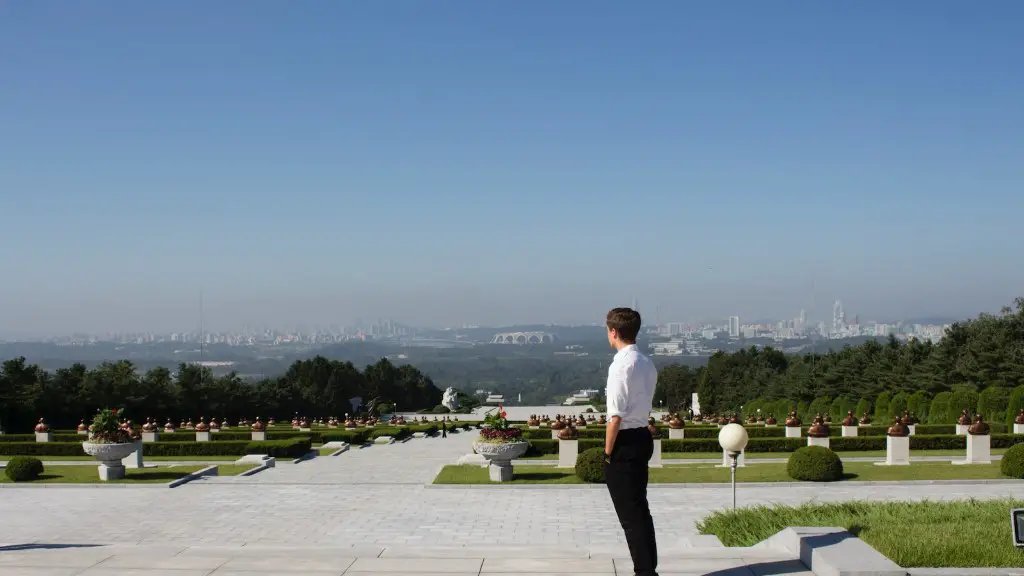Kim Jong-un is currently the leader of North Korea. He came to power in 2011 upon the death of his father, Kim Jong-Il. Kim Jong-un has held a variety of positions in the North Korean government and military, and is currently the Chairman of the Workers’ Party of Korea. Kim Jong-un has also pursued a number of economic and diplomatic initiatives in an effort to improve North Korea’s economic situation and diplomatic stance in the international community.
Since taking power, Kim Jong-un has pursued a policy of “byungjin”, which involves advancing both North Korea’s nuclear weapons program and its economy simultaneously. Kim Jong-un has also undertaken a number of reforms, including the liberalization of the economy and increased access to information technology. These reforms have been met with general acceptance from the North Korean people, however Kim Jong-un is also seeking to strengthen the country’s authoritarian rule.
Despite the international community’s disapproval, Kim Jong-un has remained committed to developing North Korea’s nuclear weapons program. This commitment has led to a number of international sanctions being imposed on North Korea, as well as increased tensions between North Korea and its neighbors. In 2018, Kim Jong-un held a summit with South Korean President Moon Jae-in, in which the two leaders agreed to work towards the denuclearization of the Korean Peninsula. However, there have been no concrete actions taken to achieve this goal.
Despite the international criticism of his policies, Kim Jong-un remains popular among the North Korean people. This is due in part to his focus on providing the population with more access to goods and services, as well as his commitment to improving the country’s infrastructure. Kim Jong-un is also seen as an embodiment of North Korea’s ideology of Juche, which promotes self-reliance and independence from outside influences.
Kim Jong-un’s rule in North Korea has been characterized by an iron-fisted approach to maintaining his rule. He has instituted a number of laws intended to limit the spread of foreign influences and maintain the power of the state. He has also been ruthless in eliminating potential opponents and dissenters from the government. This has led to a strong sense of fear and repression among the North Korean people.
Propaganda in North Korea
Propaganda is a major tool used by Kim Jong-un in his attempts to maintain his rule in North Korea. A variety of forms of propaganda are used, including billboards and posters, which promote the rule of Kim Jong-un and the ideology of Juche. The state-run media also plays an important role in perpetuating the legitimacy of Kim Jong-un’s rule and glorifying the achievements of the Workers’ Party of Korea. Propaganda is also used as an effective tool for controlling the population and preventing popular uprisings against the government.
The North Korean government also uses a variety of tactics to limit access to outside information and enforce its rule. Internet access is heavily restricted, and foreign media is banned. Travel outside of North Korea is also tightly controlled, with those who attempt to do so often risking imprisonment or death.
Human Rights in North Korea
Human rights violations are rampant in North Korea and are largely attributed to the policies of Kim Jong-un. Reports of torture, forced labor, and executions are common. In addition, many North Koreans are subject to inhumane working conditions and are subject to forced labor without pay. These abuses are particularly severe in the country’s prison system, where a lack of due process often results in many prisoners being held incommunicado for extended periods of time.
Women are particularly affected by violations of their rights in North Korea. Reports of women being sold into marriage and subject to forced labor are common. In addition, women are often subject to gender-based violence and discrimination.
The International Community’s Response
The international community has condemned Kim Jong-un’s policies and called for his government to end its human rights abuses. The United Nations and other international organizations have imposed a number of sanctions on North Korea in response to the country’s nuclear weapons program and its violations of human rights. In addition, the U.S. and other countries have pushed for the establishment of a United Nations Commission of Inquiry on Human Rights in North Korea, which is tasked with investigating the country’s human rights violations.
Despite the criticism of his rule, Kim Jong-un remains firmly in control of North Korea. It remains to be seen what effect international pressure will have on the situation in North Korea, and whether or not it will be enough to bring about meaningful change for the people of the country.
Economic Reforms in North Korea
In recent years, Kim Jong-un has pushed for economic reforms in North Korea, including the liberalization of markets and the expansion of the use of foreign currencies. These reforms have led to a significant increase in the country’s GDP and have enabled North Korea to become more connected to the global economy.
However, these reforms have also come at a cost. Critics argue that Kim Jong-un’s economic reforms have only served to increase inequality in North Korea and have done little to address the problem of poverty in the country. In addition, the limited access to foreign currencies and technological infrastructure has made foreign investment in the country difficult.
Foreign Relations
Kim Jong-un’s foreign policy has focused mainly on the diplomatic and economic isolation of North Korea from the rest of the world. Relations with China, North Korea’s closest ally, have become increasingly strained under Kim Jong-un’s rule, with the Chinese government recently taking a more critical stance towards North Korea over its continued development of nuclear weapons.
Relations with the United States have also been tense under Kim Jong-un’s rule. The Trump administration has imposed a number of sanctions on North Korea, and has sought to pressure the country into abandoning its nuclear weapons program. Kim Jong-un has been reluctant to do so, leading to increased tensions between the two countries.
Public Perception
Despite the criticism of his rule, Kim Jong-un remains popular among the North Korean people. His approval rating, while hard to measure due to the lack of reliable data, is high, and his popularity has extended outside of the country. He has been the subject of various books and films, and has become a symbol of the regime’s commitment to self-reliance and determination to withstand international pressure.
While it is difficult to assess the public perception of Kim Jong-un in North Korea, it is clear that he is a major figure in the country. His rule has been characterized by a commitment to maintaining his power and protecting the nation from outside influences, and he remains committed to building a strong and prosperous North Korea.

